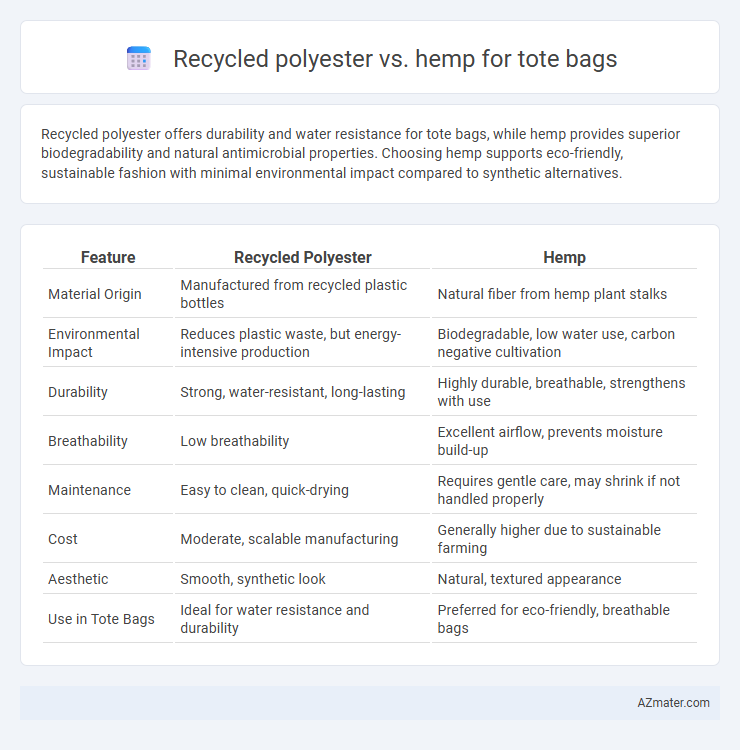Recycled polyester offers durability and water resistance for tote bags, while hemp provides superior biodegradability and natural antimicrobial properties. Choosing hemp supports eco-friendly, sustainable fashion with minimal environmental impact compared to synthetic alternatives.
Table of Comparison
| Feature | Recycled Polyester | Hemp |
|---|---|---|
| Material Origin | Manufactured from recycled plastic bottles | Natural fiber from hemp plant stalks |
| Environmental Impact | Reduces plastic waste, but energy-intensive production | Biodegradable, low water use, carbon negative cultivation |
| Durability | Strong, water-resistant, long-lasting | Highly durable, breathable, strengthens with use |
| Breathability | Low breathability | Excellent airflow, prevents moisture build-up |
| Maintenance | Easy to clean, quick-drying | Requires gentle care, may shrink if not handled properly |
| Cost | Moderate, scalable manufacturing | Generally higher due to sustainable farming |
| Aesthetic | Smooth, synthetic look | Natural, textured appearance |
| Use in Tote Bags | Ideal for water resistance and durability | Preferred for eco-friendly, breathable bags |
Introduction: The Rise of Sustainable Tote Bags
Recycled polyester and hemp are two prominent materials driving the rise of sustainable tote bags due to their eco-friendly properties and durability. Recycled polyester is made from repurposed plastic waste, significantly reducing landfill contributions and carbon footprint. Hemp, a fast-growing natural fiber, offers biodegradability and exceptional strength, making it a renewable alternative for environmentally conscious consumers.
What is Recycled Polyester?
Recycled polyester is a sustainable fabric made from post-consumer plastic waste, such as PET bottles, processed into polyester fibers. This eco-friendly material reduces landfill waste and lowers carbon emissions compared to virgin polyester production. In tote bags, recycled polyester offers durability, water resistance, and a lightweight feel while supporting circular economy goals.
What is Hemp Fabric?
Hemp fabric is made from the fibers of the hemp plant, known for its durability, breathability, and eco-friendly cultivation with minimal water and pesticides. Compared to recycled polyester, hemp offers a natural, biodegradable alternative that supports sustainable agriculture while providing a strong, lightweight material ideal for tote bags. Hemp fabric's resistance to mold and UV rays enhances its longevity, making it a preferred choice for environmentally conscious consumers.
Environmental Impact: Recycled Polyester vs Hemp
Recycled polyester, derived from plastic waste, reduces landfill and ocean pollution but still relies on fossil fuels and emits microplastics during washing. Hemp cultivation requires significantly less water and no pesticides, improving soil health and biodiversity, making it a highly sustainable fiber. Choosing hemp for tote bags supports carbon sequestration and offers a biodegradable alternative, vastly minimizing environmental footprint compared to recycled polyester.
Durability and Strength Comparison
Recycled polyester offers high tensile strength and excellent resistance to stretching and abrasion, making it a durable choice for tote bags subjected to frequent use and heavy loads. Hemp fiber, known for its exceptional durability and natural resistance to wear and tear, provides comparable strength while being biodegradable and environmentally sustainable. When comparing the two, recycled polyester excels in moisture resistance, whereas hemp boasts superior breathability and long-term resilience under rough conditions.
Comfort and Aesthetic Appeal
Recycled polyester offers a smooth texture and vibrant color retention, making tote bags visually appealing and comfortable to carry for extended periods. Hemp provides a natural, breathable fabric with a slightly coarse texture that softens over time, enhancing comfort and lending an earthy, rustic aesthetic. Both materials balance durability with style, but hemp's unique fibers create a distinctive look that ages gracefully compared to the consistent, sleek finish of recycled polyester.
Manufacturing Process and Resource Use
Recycled polyester is produced by melting and re-spinning plastic waste, primarily PET bottles, into fibers, significantly reducing reliance on virgin petroleum-based materials while consuming less water and energy compared to virgin polyester production. Hemp cultivation requires minimal pesticides, fertilizer, and water, thriving on less intensive agricultural inputs, making it a sustainable fiber with lower environmental impact during growth. The manufacturing process for hemp fibers involves retting, decortication, and spinning, which is more labor-intensive but yields durable, biodegradable material that contrasts with the synthetic nature of recycled polyester fibers used in tote bags.
Cost Analysis: Which is More Affordable?
Recycled polyester typically costs less than hemp due to lower raw material and manufacturing expenses, making it a budget-friendly choice for tote bags. Hemp production involves more labor-intensive cultivation and processing, which increases its price despite offering superior durability and eco-friendliness. Businesses seeking affordable tote bags often prefer recycled polyester, while eco-conscious brands may invest in hemp despite higher costs.
End-of-Life: Biodegradability and Recycling
Recycled polyester tote bags face challenges at end-of-life due to limited biodegradability, often requiring industrial recycling facilities to prevent environmental accumulation. Hemp tote bags offer superior biodegradability, breaking down naturally in soil within months, reducing landfill burden and ecological impact. Recycling infrastructure for recycled polyester exists but is energy-intensive, while hemp's natural decomposition provides a low-impact alternative that minimizes plastic pollution.
Which Material is Better for Tote Bags?
Recycled polyester offers durability and water resistance, making it ideal for everyday tote bags that require strength and easy maintenance. Hemp provides superior breathability, natural antimicrobial properties, and sustainability, appealing to eco-conscious consumers seeking biodegradable and chemical-free materials. For long-term environmental benefits and a natural feel, hemp is usually the better choice, while recycled polyester excels in performance and weather resistance.

Infographic: Recycled polyester vs Hemp for Tote bag
 azmater.com
azmater.com